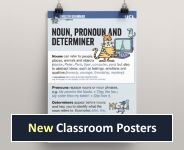Antonymy 3
Objective
To examine verb antonyms, and how they are formed and used.
Activity 1
Antonyms are also very common with verbs.
Just like adjectives and nouns, they can be formed by adding a prefix.
1. I tied my shoes.
2. I untied my shoes.
Activity 1
Look at this list of six verbs.
What is the antonym for each one? Which prefix do we use to change it?
- to like
- to agree
- to fasten
- to wrap
- to classify
- to stabilise
Match the appropriate prefix to the verb. Drag the prefix to the front of the verb card. Double click to separate.
Here are the correct prefixes. Write a sentence using the original word and its antonym.
- to dislike
- to disagree
- to unfasten
- to unwrap
- to declassify
- to destabilise
Activity 2
Do you notice any difference in meaning between 1-2 and 3-6?
- to dislike
- to disagree
- to unfasten
- to unwrap
- to declassify
- to destabilise
Not all prefixes change the meaning of the verb in the same way:
Examples 1-2 are negative. The simply mean the opposite of the original verb.
Examples 3-6 are reversative. This means the antonym denotes that the action was reversed or undone.
Here are some more verbs. Choose the right prefix to make them reversative.
- to allow
- to embark
- to tie
- to obey
- to continue
- to do
Here are the correct prefixes. Write a sentence using the original word and its antonym.
- to disallow
- to disembark
- to untie
- to disobey
- to discontinue
- to undo
Activity 3
Like with nouns, we can also use the prefix mis- with verbs.
E.g. to spell - to misspell
This prefix implies oppositeness, but also it also implies something else - what?
The prefix mis- implies that the verb was performed badly or wrongly.
Add the mis- prefix to these six examples, and then write a sentence for the antonym and the original word.
- direct
- hear
- lead
- place
- manage
- apply
Welcome!

Englicious is totally free for everyone to use!
But in exchange, we ask that you register for an account on our site.
If you’ve already registered, you can log in straight away.
Since this is your first visit today, you can see this page by clicking the button below.
- Printer-friendly version
- Log in to view or leave comments

